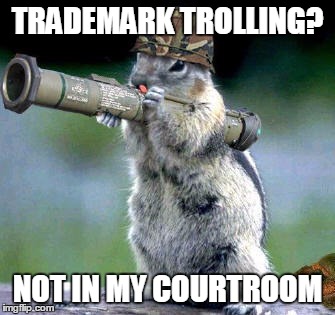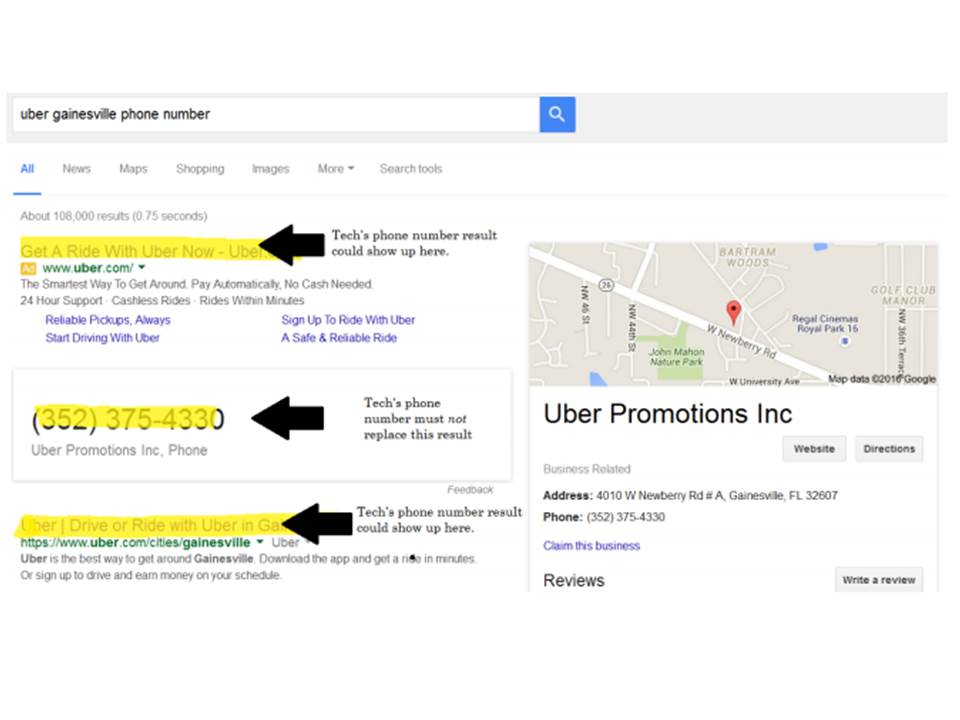Court Orders Uber To Control Its Google Search Results
What happens when national trademarks, used on the borderless Internet, conflict with regional trademarks? This is one of the most venerable topics in Internet Law; see, e.g., the Blue Note case from 20 years ago. More recently, Jake blogged about an interesting 2012 ruling where the regional trademark owner couldn’t stop the national trademark owner from using the trademark on the Internet, even locally. Uber recently ran into a similar issue in Florida, and the court attempts to fashion a creative resolution that unfortunately doesn’t quite work.
At issue is a regional trademark owner, Uber Promotions, that provides limousine services in the Gainesville, Florida market with a first use in 2006. Uber, the well-known decacorn, entered the Gainesville market in 2014, but it tries to backdate its priority to a 2010 trademark application. Even with the backdating, Uber Promotions is the senior user in the Gainesville market. Further, Uber Promotions marshaled anecdotal evidence of actual confusion and explained it was being harmed by all of the negative press being directed towards the other Uber.
So what relief? The judge rejects Uber Promotions’ request to force the other Uber to change its trademark in the Gainesville market, saying:
a preliminary injunction should not serve as a bazooka in the hands of a squirrel, used to extract from a more fearsome animal a bounty which the squirrel would never be able to gather by his own labors—at least not when the larger animal is mostly without sin.
In other words…
Seeking a more narrow solution, the court issues a preliminary injunction that includes the following provision:
Defendant must ensure that a search conducted with the Google, Yahoo, or Bing search engine using the keywords “Uber Gainesville phone” or “Uber Gainesville phone number” returns a result containing Defendant’s 352-area-code number along with words clearly indicating that the result is associated with Defendant. Such words may include “driver partner,” “app,” or “ride.” Defendant must ensure that this result, while prominently displayed on the search results page, does not replace the result for Plaintiff’s phone number that is currently returned when a search is conducted using these keywords. Compliance may entail using the search engines’ paid advertisement features such as Google AdWords.
Defendant must ensure that a search conducted with the Google, Yahoo, or Bing search engines using the keywords “Uber promotions Gainesville phone” or “Uber promotions Gainesville phone number” does not return a result with Defendant’s 352-area-code number
The judge’s goal is to make sure that Gainesville searchers seeking to reach Uber Technologies see a local Gainesville phone number; without it, they will assume Uber Promotions’ phone number is the local point of contact. The judge even gives a screenshot of what he wants:
(I’m sure SEM experts are cringing at the idea that the judge wants the phone number in the ad title line. Ad titles are limited to 25 characters, and a phone number will take 12 of those characters).
I applaud the judge for trying to craft a more search engine-savvy injunction that would reduce the actual confusion suffered by the regional trademark owner while not otherwise stopping the national player. Unfortunately, this compromise is just a bit too clever. Notice the order didn’t say that Uber should “try,” the order said Uber must “ensure.” Yet, Uber can’t ensure that Google or the other search engines will display any particular organic search results, nor can it ensure exactly what information is presented in those organic results. The order implies that Uber can use AdWords or other keyword ads to satisfy its affirmative disclosure obligation, but due to quality scores, Uber can’t guarantee top–or any–AdWord placement no matter how high its CPC bids are (see the Bitchen Kitchen case for more problems with making legal outcomes depend on relative search results placement). Further, while Uber can use negative keywords to avoid showing ads when people search for any variation of “Uber promotions,” it can’t ensure its phone number doesn’t appear in the organic results for those keywords. For example, Google will often show results where it has 3 of the 4 search keywords and indicate that it ignored the fourth. And then there are the challenges created by personalized and localized search results and the demise of one-size-fits-all search results pages…
It seems inevitable that Uber Promotions will capture screen shots showing Uber Technologies out of compliance with this injunction. So what will Uber Technologies do? Will it go back to the judge now and explain why it can’t ensure these outcomes? Or will Uber give it a good faith try and gamble that the judge won’t hold it in contempt if search results inevitably fall out of compliance with the order?
* * *
BONUS: While the injunction piece didn’t quite work, this opinion has a lot to commend it. For example, the court characterizes trademark’s multi-factor likelihood of confusion test as follows (emphasis added):
Every circuit uses some n-factor test for likelihood of confusion, where n is an integer that is almost certainly too large for the task at hand [with a cite to Barton Beebe]
So true. LOVE IT!!! #JunkTheMFLOCCTest
And when talking about how big a bond Uber Promotions should post, the judge gets all exponential:
Thinking in terms of orders of magnitude, it seems that one thousand (103) dollars would be too low and one hundred thousand dollars (105) would be too high. Ten thousand (104) dollars may or may not be close, but it’s certainly in the right ballpark.
Credit for this opinion goes to Judge Mark E. Walker. For his cite to Prof. Beebe, his quotable diss of the multi-factor test, his math geekiness and his invocation of the squirrel-with-bazooka meme, Judge Walker earns the highly coveted and rarely awarded Technology & Marketing Law Blog’s judge of the day honors.
Case citation: Uber Promotions, Inc. v. Uber Technologies, Inc., 2016 WL 617450 (N.D. Fla. Feb. 16, 2016)



Pingback: SearchCap: comScore Search Share, Google Search Console Data & Search Agencies()
Pingback: Trademark Court's Impossible Order: Uber Told To Change Google Search Results()